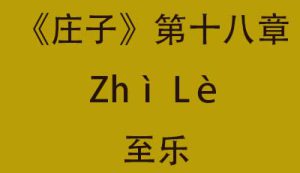The Chapter 18 of Zhuangzi ( “Supreme Happiness”)

Zhuangzi’s “Supreme Happiness”: A No-BS Guide to True Joy
So, you wanna be happy? Yeah, join the club. Everyone’s chasing pleasure, wealth, fame, or some idea of “success.” But Zhuangzi—ancient China’s OG wisdom-drop philosopher—is like, “Hold up. You’re looking for happiness in all the wrong places.”
That’s what “Supreme Happiness” (至乐) is about. It’s not your typical self-help fluff. Instead, Zhuangzi throws curveballs to make you question what happiness even is. Spoiler: It’s probably not what you think.
1. The Happiness Trap: Why Your Goals Might Be BS
Zhuangzi starts by asking: “What’s truly happy? Is it money? Power? Living forever?” Then he dismantles each one:
- Wealth? Rich people work themselves to death worrying about losing it.
- Status? Politicians stress over keeping their throne (or their head).
- Long life? Even if you live 800 years, you’ll still suffer like everyone else.
His point? The stuff we think brings happiness often comes with hidden misery. It’s like chasing a dopamine hit—it feels good for a second, then you’re back to square one.
Zhuangzi’s mic drop: “The world is full of people who ‘win’ but are miserable. So why are we copying them?”
2. The Weirdest Funeral Ever (And Why It’s Genius)
The chapter’s most famous story is about Zhuangzi’s wife dying. His buddy Huizi shows up to console him… and finds Zhuangzi singing and banging on drums like it’s a party.
Huizi’s like, “Dude, WTF? Your wife just died!”
Zhuangzi’s response? “At first, I was sad. But then I realized: before she was born, she didn’t exist. Then she lived, died, and now she’s back in the cosmic flow. Why should I cry? That’s like sobbing because winter turned to spring.”
Lesson: Happiness isn’t about clinging to life or resisting death. It’s about flowing with change—even when it sucks. Fighting reality = suffering.
3. “Is Life Even a Big Deal?” (The Skeptical Skeleton)
Next, Zhuangzi hits us with a trippy dream convo with a skull. He finds a dried-up skull on the road, jokes about it, then uses it as a pillow. That night, the skull haunts his dream and says:
“You think being alive is so great? Dead people have no taxes, no drama, no pressure. We just vibe forever. You pity me? LOL.”
Zhuangzi wakes up shook. Was the skull right? Is death… not that bad?
Takeaway: Our fear of death (and obsession with “staying alive”) might be overrated. Happiness isn’t about avoiding the inevitable—it’s about accepting it.
4. The Joy of Being a Useless Tree (Seriously)
Zhuangzi loves uselessness as a metaphor for freedom. A giant tree survives because it’s too gnarled for lumber. Meanwhile, “useful” trees get chopped down.
Same with people: If you’re too successful, everyone wants a piece of you. But if you’re “useless” (by society’s standards), you’re left alone to enjoy life.
Modern translation: Stop trying to be an “influencer.” The hustle culture grind might be killing your joy.
5. The Secret Sauce: Wu Wei (Effortless Happiness)
“Supreme happiness” isn’t something you achieve—it’s what’s left when you stop forcing things. Zhuangzi calls this “wu wei” (無為)—acting without struggle, like water flowing downhill.
Examples:
- A duck’s legs are short, but it doesn’t stress about not being a giraffe.
- A fish doesn’t try to swim; it just does.
Key idea: Happiness isn’t out there. It’s in not fighting your nature.
6. Why Even ‘Good’ and ‘Bad’ Are Fake News
Zhuangzi’s ultimate mind-bender: What if ‘happiness’ and ‘suffering’ are the same thing?
He tells a story of a bird that only eats fancy food and lives in palaces… but dies of stress when it’s taken to the forest. Meanwhile, a wild rat thrives in garbage.
Translation: Your idea of “good” might be someone else’s nightmare. Stop judging your life by others’ rules.
TL;DR: Zhuangzi’s Happiness Cheat Code
- Question your desires (Are they yours or society’s?).
- Embrace change (Even death isn’t the enemy).
- Be ‘useless’ sometimes (Not everything needs a “purpose”).
- Go with the flow (Wu wei > hustle).
- Drop the labels (“Good” and “bad” are mental traps).
Final thought: Zhuangzi isn’t saying “be happy all the time.” He’s saying: Stop chasing happiness like it’s a trophy. It’s already here—when you let go.
Modern Parallels
- Minimalism: Owning less = less stress.
- Mindfulness: Be present instead of obsessing over the future.
- Anti-work movement: “Success” ≠ burning out.
Zhuangzi was basically the first chill philosopher. His version of “supreme happiness”? Not giving a damn (in the wisest way possible).
